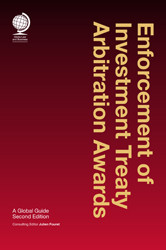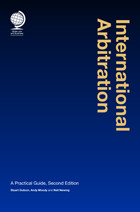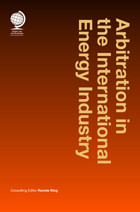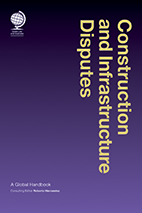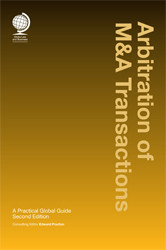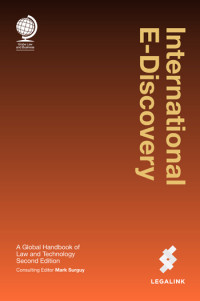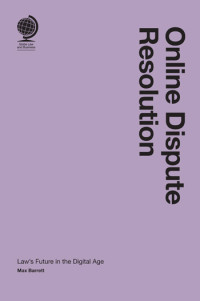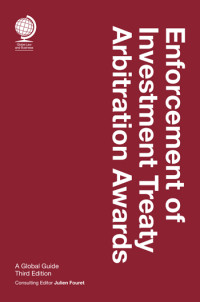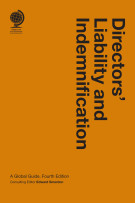
Consulting editor(s): Julien Fouret, Eversheds Sutherland
Publication date: Jan 2021
Format: Hardback
Pages: 800
Price: £225.00
Discounted Price: £135.00
ISBN: 9781787423497
How our eBook platform works
How permanent access, multi-user eBooks work
Add to basket (UK and Europe)Add to basket (USA, rest of world)
Add to basket (UK and Europe)Add to basket (USA, rest of world)
Review from previous edition: A great contribution to the field and a must-have for every investment arbitration lawyer.
,
Review for previous edition: Highly recommended: The combined academic quality of the analysis and the practical approach of the contributions is a hallmark of this book. The chapters also feed into one another seamlessly. Ultimately, this book provides a complete and exhaustive review of the various issues.
,
Review from previous edition: It is doubtful that there exists a more thorough examination of the law on the enforcement of investment treaty awards. This book will be an invaluable guide to parties planning for, seeking or defending against enforcement actions.
,
Review for previous edition: A very well thought-through tool with a practical use. Any lawyer faced with enforcement issues of investment treaty awards should consider this book a 'must-have'. One can only wish that this book will be regularly updated.
Review for previous edition: This book provides a substantive analysis of general principles as well as a comparative study across diverse jurisdictions. It fills a void in arbitral literature and will prove extremely useful for both academics and practitioners.
,
This book provides substantial insights into the complex area of enforcement of investment treaty awards and its implications across a host of jurisdictions around the world. The wealth of substantive contributions and practical tips provided in this Second Edition by Julien Fouret and the leading practitioners who contributed country-specific analyses will arm any practitioner with the tools needed to understand and tackle investment treaty arbitration award enforcement effectively. This book is a must-have for investment treaty arbitration lawyers who are concerned not only with securing favorable awards, but also with enforcing them successfully.
,
The practical perspective adds considerable values to the book for both practitioners and academics “as few publications address the various issues that arise at the end of an investment arbitration, when the award creditor faces the difficulty of ensuring the efficient enforcement of an investment arbitration award which is, by essence, final.”
Secondly, this book timely updates the already comprehensive and thorough national reports. The efforts and devotions of the editors and chapter authors deserve highest compliments and heartfelt thanks. They masterfully manage 38 chapters in a consistent and streamlined manner.
Thirdly, it responds to cutting-edge discussions and practices.
,
This book is sui generis in the sense that the compendium is an ideal blend of theory and practice. The author has not come across any other book which has done justice to the topic of “enforcement of investment arbitration”. Whether a counsel is seeking, planning to initiate enforcement proceeding or a State contemplating strategies to defend itself from paying award amount - this book will provide impeccable guidance in terms of both theory and practice. Having said that, this book is indispensable not only for arbitration practitioners but also for academicians, government officials, policymakers, and other stakeholders in the field of investment arbitration.
,
The growth in cross-border investments in an increasingly globalised economy means that there are more international disputes between foreign investors and states than ever before. Investment treaty arbitration has become the preferred dispute resolution mechanism for resolving such disputes, however, securing a final arbitral award is often just the beginning of a complicated process.
Spearheaded by leading arbitration practitioner, Julien Fouret, this second edition brings together 70 experts to provide substantive analysis of recurring issues at the award enforcement stage plus practical perspectives on enforcing awards based on investment treaties. It further explores topics ranging from the specifics of the International Centre for Settlement of Investment Disputes mechanism to the enforcement of interim relief and the issues of sovereign immunity and state entities, as well as exploring intra-EU BIT disputes and their enforcement consequences.
This edition features additional country-specific chapters and now covers over 30 jurisdictions, including updated coverage of applicable international and domestic legal frameworks and reviews of the most recent practices. Jurisdictions new for this edition include: Algeria, Belgium, Cameroon, Democratic Republic of Congo, Czech Republic, Greece, Lebanon and Romania.
Whether you are an arbitration lawyer in private practice or a user of investment treaty arbitration, this edition will provide you with holistic, practical and theoretical insight on the most important step of an arbitral process against a state or state entity.
New chapters:
- Enforcement of ICSID awards in national courts
- Algeria
- Belgium
- Cameroon
- Czech Republic
- Democratic Republic of Congo
- Enforcement of intra-EU arbitration awards
- Greece
- Lebanon
- Romania
Also new to this edition:
- Coverage of the enforcement of investment treaty awards against sovereign States, which will help practitioners when assisting both foreign investors and sovereign States in enforcement proceedings
- Provides comprehensive knowledge of the practice of both ICSID and non-ICSID tribunals with respect to stays of enforcement and insights as to the approach that one might expect tribunals to adopt in future cases
- Identifies trends that will assist practitioners in preparing their approaches when considering, or responding to, interim relief applications in investor-state arbitration
- Provides an understanding of how courts in various jurisdictions, in particular the United States, the United Kingdom, and Australia have recently interpreted the text of the ICSID Convention as it relates to enforcement and sovereign immunity, and what this means for the future of the investment dispute system
- Analysis of new legislation, notably in Belgium and France, which have rendered more complicated the enforcement of arbitral awards, notably Investment Treaty Arbitration awards, because of a reinforcement of immunities and of the protection of State’s properties
- Coverage of the adoption of a Model BIT in Bolivia, and the legal reforms that limit its exposure to investment treaty awards, offering helpful guidance on how to minimise the impact of such reforms on domestic enforcement actions
- Reflection on the replacement of the pre-existing model BIT in Russia with new rules which provide for less investor-friendly conditions in new BITs being negotiated
- Consideration of the recently signed United States-Mexico-Canada Agreement (USMCA), which will change significantly the previous investor-state arbitration mechanisms, as well as new developments in federal court jurisprudence concerning the procedures to recognise ICSID awards in the United States
- A look at the recent influx of cases seeking to enforce arbitral awards arising out of intra-EU bilateral investment treaties, or multilateral investment treaties against EU member states that have been deemed incompatible with EU law. The analysis of the United States courts' adjudication of the complex issues arising from these cases will assist readers in evaluating the suitability of the United States as a forum for actions to enforce such awards




